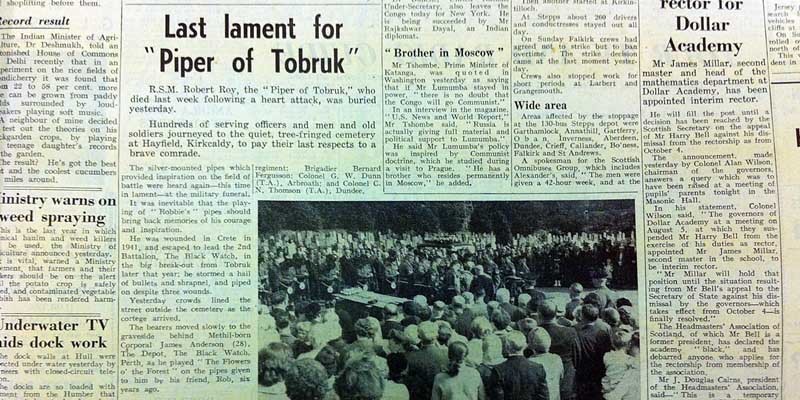Tributes poured in from across the world when Scots hero piper Bill Millin who led troops during the D-Day landings in 1944 died last week aged 88. But, as Bruce Fegen reports, he wasn’t the only piper to gain fame during the second world war.
Three years earlier, another Scot had achieved similar hero status when he led the 2nd Battalion Black Watch at the famous break-out at Tobruk after being besieged by Axis forces.
Tuesday marks the 50th anniversary of the death of Black Watch Pipe Major Robert “Rob” Roy, MBE, DCM, who died from a brain haemorrhage at Edinburgh Castle on August 24, 1960, where he was rehearsing for the lone piper role at the Military Tattoo.
He gained the title Piper of Tobruk for his bravery in 1941. Felled by a bullet at the start of the breakout, he got to his feet and continued playing, only to be hit again.
Once more he got to his feet, but was hit a third time. Unable to get up this time, he kept playing his pipes while lying on the ground.
Pipe Major Roy went on to serve in India and Burma, returning to the 7th Battalion in 1944, where he served with distinction during the final European campaign.
In March 1949 he was posted to TA HQ in Kirkcaldy where he remained for three years, before moving to Dundee as RSM of 4/5th Black Watch. In May 1957 he was posted to Gibraltar as garrison RSM.
After his death, a military funeral took place at Hayfield Cemetery in Kirkcaldy, his favourite town, when his pipes that had inspired men on the battlefield were heard again in lament.
Five senior army officers who had commanded Pipe Major Roy were among those who joined his widow Hilda at the graveside.
Today, 50 years on, Hilda (85) still lives in Kirkcaldy, as do her daughter, Kirkcaldy councillor Alice Soper, and son Robert. And another daughter Margaret lives in Musselburgh.
Alice and Margaret said, “It’s been amazing to hear from so many people who knew our father over the years, even from a former prisoner of war German soldier who tried to locate him in the 1990s.
“As young children we grew up with the sound of pipes being played by students in every spare room in our Dundee home.
“Their sound still evokes a curious mix of emotions they cheer you up one minute, yet make you feel a little sad and homesick at the same time.
“The drone of the pipes, wailing a slow lament, turns your mind to all those who gave their lives for their country.
“They may be gone, but none will be forgotten.”
